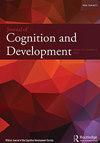How Executive Functions Correlate with Intelligence in Children and Adolescents in Autism Spectrum Disorders
IF 2.1
2区 心理学
Q3 PSYCHOLOGY, DEVELOPMENTAL
引用次数: 0
Abstract
ABSTACT Dysexecutive syndrome has been consistently reported in children and adolescents with autism spectrum disorders (ASD). Particularly, impairments have been documented in working memory, inhibition, and mental flexibility. However, the relationship between executive impairments and intellectual functioning is far from clear in this population. This study aimed to investigate how executive functions (EF) are associated with intelligence in ASD. Children and adolescents with ASD (N = 69) were compared to typically developing (TD) individuals (N = 68), matched in chronological age and sex. The Wechsler Intelligence Scales were used to assess participants’ intelligence quotient (estimated IQ). EF – working memory, shifting, and inhibition – were assessed using the Digit Span, Wisconsin Card Sorting Test and Stroop Test, respectively. TD individuals outperformed ASD in all cognitive assessment measures. Correlation analysis showed that while for the ASD group intelligence was associated with shifting abilities, in the TD group the association was observed for working memory measures. Linear regression analysis supported that the association between intelligence and EF domains differed between groups, particularly regarding shifting abilities (interaction term significant), whereas working memory showed a similar trend in both groups (difference in effect size is non-significant). Results suggest that specific executive function domains are associated with ASD intellectual functioning and differ from TD individuals, which may be related to adaptive behavior outcomes.自闭症谱系障碍儿童和青少年的执行功能与智力的相关性
儿童和青少年自闭症谱系障碍(ASD)中一直有执行障碍综合征的报道。尤其是在工作记忆、抑制和精神灵活性方面的损伤。然而,在这一人群中,执行障碍和智力功能之间的关系还远不清楚。本研究旨在探讨执行功能(EF)与ASD智力之间的关系。患有ASD的儿童和青少年(N = 69)与正常发育(N = 68)的个体(N = 68)进行了比较,他们的实际年龄和性别相匹配。韦氏智力量表用于评估参与者的智商(估计智商)。EF -工作记忆,移位和抑制-分别使用数字广度,威斯康星卡片分类测试和Stroop测试进行评估。TD个体在所有认知评估措施中表现优于ASD。相关分析表明,ASD组的智力与移动能力相关,而TD组的工作记忆测量也存在关联。线性回归分析支持智力和EF域之间的关联在两组之间存在差异,特别是在移动能力方面(相互作用项显著),而工作记忆在两组中表现出相似的趋势(效应大小差异不显著)。结果表明,特定的执行功能域与ASD智力功能相关,并且与TD个体不同,这可能与适应性行为结果有关。
本文章由计算机程序翻译,如有差异,请以英文原文为准。
求助全文
约1分钟内获得全文
求助全文
来源期刊

Journal of Cognition and Development
Multiple-
CiteScore
4.00
自引率
0.00%
发文量
29
期刊介绍:
The Journal of Cognition and Development is the official journal of the Cognitive Development Society (CDS). Some CDS members are concerned with basic research or theory; others focus on policy issues and practical applications. The range of interests includes cognitive development during all stages of life, and we seek to understand ontogenetic processes in both humans and nonhumans. Finally, their interests encompass typical as well as atypical development, and we attempt to characterize both biological and cultural influences on cognitive change and continuity.
 求助内容:
求助内容: 应助结果提醒方式:
应助结果提醒方式:


